Abstract
Questionsunder study/principles: Peer-assisted learning (PAL), the instruction of less experienced students by advanced “peer” students, increasingly gains popularity. In addition, for acquisition of skills the use of mannequins as a substitute for real patients is common practice. This study aimed to test the acceptance and value of PAL in heart and lung auscultation on mannequins from the student’s point of view. Methods: Six students were selected as peer-students and instructed by both medical specialists and university teaching experts. Cardiology Patient Simulator “K” and Lung Sound Auscultation Trainer were used as mannequins. Quantitative and qualitative aspects of PAL were evaluated by a questionnaire at the end of each course using Likert-like scales (from 1, worst, to 4, best). Result: Ninety-six third-and fourth-year medical students participated in the PAL courses at the University of Zurich in the autumn term 2014. Best ratings were given for peer-students’ behaviour (none below 4), whereas the lowest grades were given for mannequin quality. Mean overall rating of the courses and peer-student teaching skills were rated to be very high. Conclusions: Peer-assisted teaching in auscultation of the heart and lungs was feasible and well accepted by participating students. In this study, there was no statistical difference between cardiology and pulmonology for the performance, content or perceived learning success of peer-assisted auscultation training. The mannequins used appeared acceptable for auscultation training.
Introduction
Peer-assisted learning (PAL) describes the instruction of less experienced students by advanced students – called peer-students – who have been educated by specialists. This way of teaching is not a new concept, as it can be seen in older literature [1]. Nowadays, PAL is increasingly gaining popularity. Recently, several universities tested and promoted this upcoming system in different areas [2,3]. In medical teaching, disciplines like neurological examination, ophthalmology training, basic surgical skills or training in basic life support have been described as suitable for PAL [2,4–7]. Elaborate mannequins have been used for peer-assisted heart and lung auscultation. The degree of reality of a simulator is called fidelity. This describes not only the good functioning of the technology, but also the “psychological engagement of the learner” [8].
Recent studies document the benefits of PAL. Firstly, replacing and relieving doctors by peer-students is considered a way of saving teaching resources [9]. Furthermore, peer-students get a great chance to learn on how to present in front of an audience [[9,10]. Considering that medical students are prospective residents with an extensive teaching role, early teaching experience might prove even more important [11,12].
In 2013, the University of Zurich decided to introduce PAL into the skills laboratory programme. Among students, however, this action provoked conflicting reactions. The most commonly expressed concern was an expected decline in teaching quality by use of cheaper and less qualified students instead of trained specialists. The Students' committee of the Faculty of Medicine, University of Zurich, therefore decided that this novel teaching method should be accompanied by a research project verifying the achievement of the University’s goals.
This study aimed to test the acceptance and value of PAL in the auscultation of heart and lungs in the opinion of the students. In addition, we examined whether the use of mannequins was perceived as equally suitable for both teaching courses and might provide an adequate substitute for patients.
Methods
General Course Information
The project was undertaken in the autumn term 2014 at the University of Zurich. Courses lasted 2 hours and involved four to six students. Course participation was completely voluntary. Participants were given the choice between cardiology and pulmonology. Only third and fourth-year students were accepted as participants.
Selection and Training of Peer-Students
The Students’ committee of the Faculty of Medicine of the University of Zurich reviewed a total of 28 candidates. Six students were selected on the basis of previous teaching experience (sports coach, tutor in anatomy course, leader of a scout movement, private tutor, etc.) and a persuasive letter of motivation.
Selected peer-students completed additional courses given by a cardiologist (CAW) and a pulmonologist (LCH). The courses contained theoretical and practical auscultation skills as well as instructions on how a lesson in PAL could be prepared. Additionally, peerstudents were taught how to operate the heart and lung simulator. Furthermore, the programme was accompanied by a representative (EF) of the Centre for University Teaching and Learning of the University of Zurich, ensuring that the peer-students were coached not only in medical but also in teaching skills. According to the amount of teaching lessons, peer-students were given modest monetary compensation.
Material
The mannequin for cardiac auscultation was a Cardiology Patient Simulator “K” (Kyoto Kagaku Co., Kyoto, Japan), and that for lung auscultation was a Lung Sound Auscultation Trainer “LSAT” (Kyoto Kagaku Co., Kyoto, Japan). Individual stethoscopes had to be brought along by the students and therefore were not standardised.
Programme Evaluation
Questionnaires were distributed at the end of every course (Figure 1). The questionnaires consisted of quantitative analysis adapted from a questionnaire used by the University of Bern [13], as well as open questions. To achieve a high response rate, students were requested to fill in the forms on-site. The programme evaluation quality was ensured by use of the Program Evaluation Standards of the Joint Committee on Standards for Educational Evaluation (JCSEE) [14]. There was no need for ethics approval.
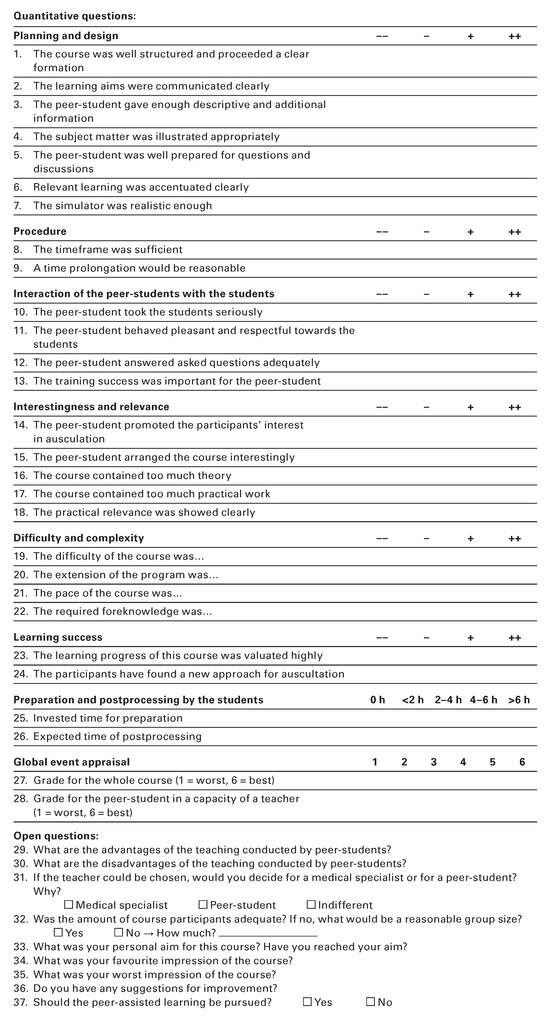
Figure 1.
Questionnaire filled in by the participating students at the end of the course. For the topics planning and design, procedure, interaction of the peer-students with the students, interestingness and relevance, and learning success, the participants could rate the statement by means of a score between 1 (––) to 4 (++), whereby –– means “NOT correct at all”, – stands for “rather not correct”, + implies “rather correct” and ++ means “absolutely correct”. For the topic difficulty and complexity, the statements could be assessed with a score between 1 to 5, whereby 1 means “much too less/little”, 2 stands for “rather too less/little”, 3 means “exactly right”, 4 implies “rather too much/ big/fast” and 5 stands for “too much/big/fast”.
Statistical Analysis
Categorical data are given as percentage and continuous data are expressed as mean ± standard deviation. Continuous data were compared using the Mann-Whitney test, and categorical data were analysed using the chi-square test. A p-value of <0.05 was considered statistically significant. Statistical analyses were performed using SPSS (Version 21) as well as Microsoh Excel (2008).
Results
Course Characteristics
Twenty-four courses were held and evaluated – 12 in pulmonology and 12 in cardiology. PAL courses were attended by 96 third and fourth-year medical students, 54 (56.3%) in cardiology and 42 (43.8%) in pulmonology. Almost three-quarters of the participating students were female (72.2%). This represents a significant higher attendance rate of female students as compared with the gender distribution in the ongoing (compulsory) lectures and courses of the Medical Faculty of the University of Zurich (female 58.6%, p = 0.015) [15]. The mean age was 23.3 ± 2.4 years. 64 (66.7%) of the participants were fourth-year students, 25 (26.0%) of them were third-year students and for seven students the study year was unknown.
Quantitative Analysis
The results of the quantitative analysis are shown in Figure 2. There was no relevant difference between the cardiology and pulmonology courses for any of the questions in the quantitative analysis or any of the subchapters (p >0.05), except for the practical relevance of the demonstrated cases. The mean scores for the subchapters were as follows: planning and design (3.8 ± 0.40 in pulmonology and 3.9 ± 0.36 in cardiology), simulator (3.0 ± 0.60 in pulmonology and 2.9 ± 0.57 in cardiology), procedure (3.0 ± 0.37 in pulmonology and 3.0 ± 0.61 in cardiology), interaction of the peerstudents with the students (4.0 ± 0.13 in pulmonology and 4.0 ± 0.17 in cardiology), interestingness and relevance (3.9 ± 0.37 in pulmonology and 3.7 ± 0.54 in cardiology), learning success (3.3 ± 0.68 in pulmonology and 3.3 ± 0.63 in cardiology). The best marks were given for the peer-students’ behaviour and the fact that peerstudents took the learner students seriously (no mark below 4), whereas the lowest grades were given for the mannequin quality (3.0 ± 0.60 in pulmonology and 2.9 ± 0.57 in cardiology). The only significant difference between disciplines was found for the practical relevance of demonstrated cases (3.9 ± 0.26 in pulmonology and 3.6 ± 0.52 in cardiology, p = 0.032).
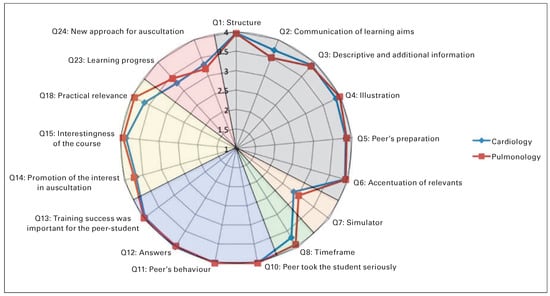
Figure 2.
Quantitative analysis of questions 1–8, 10–15, 18, 23 and 24. This figure illustrates the high satisfaction of participants with peer-assisted learning. Furthermore, the rather bad evaluation of the simulator can be seen. (grey: planning and design; orange: simulator; green: procedure; blue: interaction of the peer-students with the students; yellow: interestingness and relevance; red: learning success).
Overall Course Rating
The overall evaluation of the course was positive: the mean grade for the whole course was 5.51 ± 0.47, and the peer-student teaching skills were perceived to be very good (mean 5.73 ± 0.41) (Figure 3) (1 = worst, 6 = best).
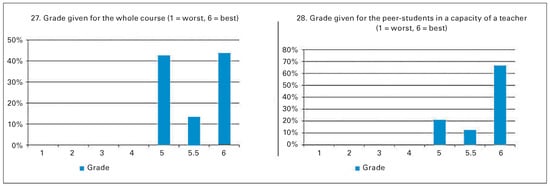
Figure 3.
Grade for the whole course and for the peer-student in a capacity of a teacher. All marks given were between 5 and 6. In these figures, the hugely satisfying grading can be seen, in which the peer-students were given the best grade by about two thirds of the participants.
Open-Ended Questions
The results of the qualitative analysis on questions 29 and 30 as well as on questions 34 and 35 are given in Figure 4 and Figure 5. The most frequent comments were that the course atmosphere and the cooperative interaction between peer-students and the participants was rated to be good (24 students). On the other hand, peer students were rated less competent in auscultation (50 students) and less clinically experienced (16 students). For question 33, most of the students stated that they wanted to improve their auscultation skills (22 times) followed by answers like the repetition (20 times), to gain a systematic approach to the auscultation (20 times) or to get a general overview (14 times). As suggestions for improvement (question 36), participants wished better and more realistic simulators (5 times). Furthermore, they requested longer and more frequent courses (3 times), further audio examples (twice), separate courses for third and fourth-year students because of the differences in knowledge (once), a quick repetition of all the sounds being heard during the course in the end of the lesson (once), that a medical specialist could pay a short visit to give answers on unresolved issues (once), and an offer of courses to teach the physical examination in cardiology and pulmonology (once). The preference between the teaching by peer-students and medical specialists is illustrated in Figure 6.
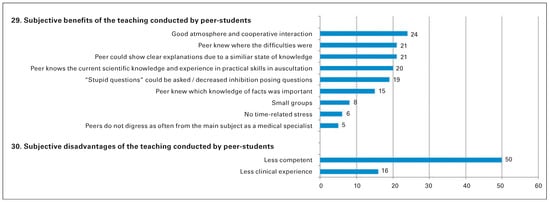
Figure 4.
Subjective benefits and disadvantages of the teaching conducted by peer-students. This figure shows the subjective benefits and disadvantages of peer-assisted learning.
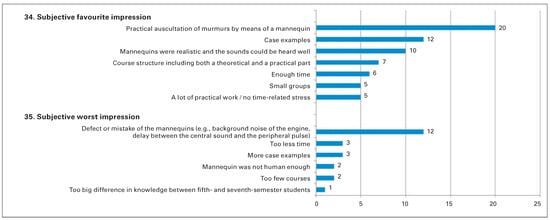
Figure 5.
Subjective favourite and worst impression of the course. This figure illustrates the subjective favourite and worst impression of the course.
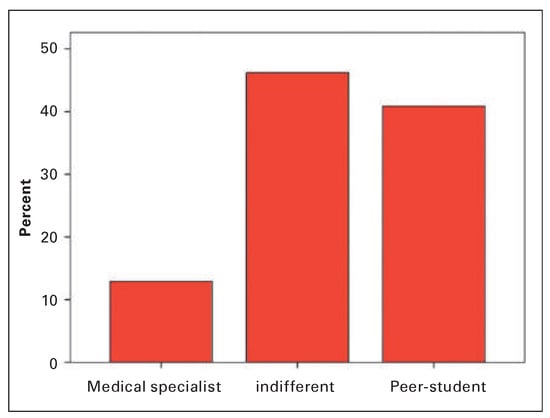
Figure 6.
Preference between peer-student and medical specialist. This figure highlights the participants’ preference by whom they want to be taught. It can be seen that students favour peer-students, whereas most of the students could not decide or wanted to be taught by both.
Group Size
The group size of four to six students was regarded as reasonable by all participants.
Subjective Opinion as to Whether Peer-Assisted Learning Ought to Be Pursued
All of the participants agreed to this question.
Discussion
In this paper, feasibility of and demand for PAL is analysed, as well as the quality of teaching, rated by students.
Overall Acceptance PAL
In our study, the feedback received was positive in general. Comparable to previous reports [16], students felt that they were in good hands when taught by peer-students. Moreover, they felt accepted with their problems and questions, and were less self-conscious when asking questions. In line with other literature [17,18], we could see that the collegial atmosphere and the same-level social and intellectual encounters were highly appreciated. Another point is made by Friedlander et al. [19]: according to their research the “encouraged interaction/questioning between learners and teachers” could be a way of provoking “the neural motivation and reward pathways”. In line with our results, there is further literature [20] showing that peer-students are better than medical specialists in detecting difficulties in understanding of the participants. They could also impart well comprehensible ex planations [20]. These issues provide potential explanations for the fact that the study population overall preferred peer-students to medical specialists.
Implementation of PAL
In our study, PAL was preferred by the study subjects over specialist teaching. However, it needs to be stressed that in the current curriculum of the University of Zurich, teaching by specialists will not be substituted by peer-assisted learning, and all students will receive teaching performed both by peer-students and by medical specialists. This approach addresses the frequently mentioned problem that peer-students were not able to answer all questions asked. As further optimisation, a first basic theoretical course ought to be held by a medical specialist (as it is already conducted for third-year students in cardiology at the University of Zurich). A subsequent, more practically orientated course could be given by peer-students, with a short general recapitulation and a lot of practical auscultation. In addition, a medical specialist could pay a short visit to the PAL course in order to clarify unanswered questions.
Motivation of Peer-Students
Although working as a peer-student involves a lot of additional work, there were more than enough applications of interested and motivated students. Apparently the net benefit of doing this job (experience in teaching) outweighs the necessary effort. It must be assumed that the small monetary remuneration adds to the motivation. The potential and prospectively important benefit of learning how to teach should not be underestimated [2]. Moreover, it is an accepted belief that a topic could be learned more efficiently when teaching it [4,16,20,21].
The Role of Auscultation Simulators
Although the advantage of simulation-based learning is documented in medical literature [5,22,23], there is ongoing discussion about the transfer of the gained skills to the real patient [24,25]. The exact benefit of simulation-based training compared with bedside teaching remains controversial [26–28]. In our study, the simulators did not receive high ratings. Nevertheless, students in our study wished to practice more with the simulators. The most frequently mentioned simulator deficits were the wrong timing of the heart sound compared with the pulsation of the radial artery. One way of reducing further criticism such as lack of reality is the use of hybrid simulators [29]. However, such advanced technique or the purchase of more realistic simulators represent a financial burden. Furthermore, the excess of information given by sophisticated simulators (high-fidelity simulators according to Gosai et al. [8]) may also be counterproductive. Novice learners especially benefited more from training with a low-fidelity simulator in an Advanced Cardiovascular Life Support (ACLS) course [30]. The authors of this study assumed that the reason for this could be found in the overflow of information given by high-fidelity simulators.
Limitations
This paper has several limitations. Most importantly, we cannot rule out a selection bias as mainly motivated students participated in the courses. Consequently, students who were sceptical towards the PAL concept probably did not participate. Similarly, there was a bias in the selection of the peer-students. All of them were highly motivated and had a certain level of teaching experience. According to Kemper et al. [31], peer-students are required to have appropriate teaching ability to ensure that courses are without any loss of quality. The influence of the financial compensation remains unknown in the current study. Furthermore, no objective measurements of learning success were performed, such as an OSCE (objective structured clinical examination). The only measurements were the subjectively perceived learning successes in the opinion of participating students. As another point, it must be kept in mind that there was no control group that can be compared with the PAL-group (as performed in other studies [31]).
Peer-students were rated with good marks in our study, but we did not compare this with ratings of similar courses given by medical professionals. The difficulty in analysis of evaluation systems is well known [32], which leads to the conclusion that further comparative studies are needed to determine the exact value of PAL over teaching by medical specialists.
Conclusions
Peer-assisted teaching in auscultation of the heart and lungs was feasible and well accepted by the participating medical students. In this study, we could show no major difference for the performance, content or perceived learning success of peer-assisted auscultation training between cardiology and pulmonology. The lack of a control group, which could prove the superiority for PAL, must be stressed. Furthermore, no objective measurements of learning success were performed. The mannequins used as a substitute for real patients appeared acceptable for auscultation training. Further studies are needed to evaluate the skill transfer to the patient as well as to show the effectiveness of PAL.
Disclosure Statement
No financial support and no other potential conflict of interest relevant to this article was reported.
Referencest
The full list of references is included in the online version of the article at www.cardiovascmed.ch.
© 2016 by the author. Attribution - Non-Commercial - NoDerivatives 4.0.